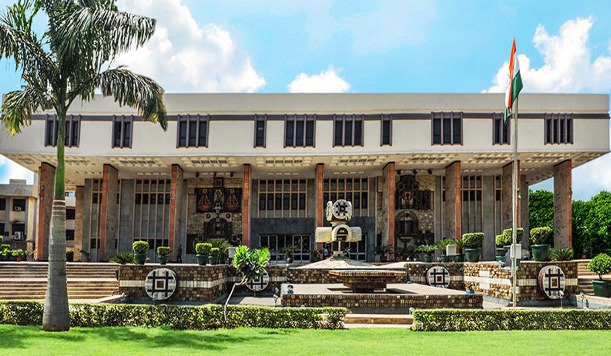Introduction
In the recent case of Blackberry Limited v. Assistant Controller of Patents and Designs [1], the single-judge bench of the Delhi High Court passed an important judgment related to the grant of patents. In this instance, the Court criticized the Assistant Controller of Patents & Designs for declining to grant a patent application while issuing a “copy-paste” order. The Court stated that orders rejecting applications for the patent award could not be issued mechanically and further stated that decisions to grant or refuse a patent must be supported by “due application of mind”, which must be reflected in the decisions.
Facts of the Case
Blackberry’s patent application titled, “Text Selection Using a Touch Sensitive Screen of a Handheld Mobile Communication Device”, vide order dated June 23, 2020, was refused by the Assistant Controller of Patents and Designs refused the application under Section 15 of the Patents Act, 1970.
The impugned Order begins by noting the procedural history of the application followed by a summary of the invention along with the points on which the Appellant laid emphasis related to the merits of the invention. The subsequent paragraph (Paragraph No. 5) mentions that Assistant Controller was unpersuaded by the Appellant’s submissions, citing a word-for-word replication of the Appellant’s claim 1. Paragraph No. 6 contains the conclusion that the subject invention is not patentable. The said paragraph is extracted below:
“6. The oral argument and the written submission of the agent of the applicant have been carefully considered. However, without prejudice, although the hearing submissions have attempted to address the other requirements, the substantive requirement of the Patents Act, 1970 i.e. Section 3(k) is not found complied with. Hence, given the above and unmet requirements, this instant application is not found in order for a grant. Also, I agree with the findings of the examiner that the subject matter as described and claimed to attract the provisions of Sections 2(1)(j) of the Patent Act, 1970.”
Observations by the Court
The Court noted that the reasons for dismissing the Appellant’s arguments are merely a word-for-word replication of their own claims. Simply remarking that the subject invention is not patentable being a mathematical or business method, a computer programme per se, or an algorithm under Section 3(k) is not sufficient. The Controller ought to have disclosed reasons to support his conclusion.
The Court emphasized that the officers in the office of the Controller of Patents and Designs must bear in mind the fact that the grant or rejection of a patent is a serious matter. A patent is meant to be a recognition of the innovative step that has been put into crafting an invention. Inventions increment the state of existing scientific knowledge and are of inestimable public interest. Therefore, any decision to grant or refuse a patent must be informed by due application of mind, which must be reflected in the decision.
In an earlier decision of SK Geo Centric Co Ltd. v. the Controller of Patents [2], it was held that that reasoning should be discernible to the Court and in the absence thereof, the entire order stands vitiated. Indeed, the Court stated that it is bewildered as to how the Controller has concluded that the subject invention is hit by Section 3(k) of the Patents Act and has plainly agreed with the Examiner’s opinion that the claimed patent is not an invention.
It must be noted that even though the date of filing of the subject application was September 16, 2008, the Order of refusal was issued by the Indian Patent Office on June 23, 2020. The Court noted that as nearly three-quarters of the 20-year patent term has expired, the Appellant is confronted with a scenario in which, even if the questioned order were to be nullified, their battle continues. Accordingly, the Court highlighted that the Officer adjudicating the claim for patent registration must bear in mind that the life of a patent is reckoned from the date when the application is made and not from the date when the patent is granted. This means that an unreasonable delay in the grant of a patent results in a reduction of its residual life, which can be a serious disinclination for inventors who seek to invent new and innovative methods, products, or processes.
The Decision of the Court
The Court held that the Assistant Controller has completely fallen short in this instance by giving an arbitrary decision, suggesting a subjective determination without any objective criteria. Such kinds of mechanical, template and cut-and-paste orders cannot sustain and must be stridently discouraged.
Accordingly, the refusal Order of the Controller was quashed and set aside, and the subject application was remanded back to the Patent Office for reconsideration.
Analysis and Conclusion
Through this case, the court has made it abundantly clear that any decision regarding the granting or rejecting of a patent should be founded on an appropriate application of thought and not be granted mechanically. It has stressed the importance of closely considering the First Examination Report and the promises made in the application (FER). The court has also stated that the decision-making procedure should be open and that the decision’s justification must be stated in plain terms.
Unfortunately, the present matter is not an isolated instance. In another recent decision of Dolby International AB v. The Assistant Controller of Patents and Designs [3], Hon’ble Mr. Justice C. Hari Shankar had the occasion to consider another unreasoned order of the Controller. The Judge was at pains to identify the reasoning in the order impugned therein and observed that concerned officers of the Controller of Patents and Designs office must bear in mind that the question of grant and rejection of a patent is a serious matter. Indeed, these words must resonate with the authorities, and it must be ensured that Patent Controller’s officers practice due application of mind while rendering decisions. Well-articulated reasons in such orders would demonstrate that the decision has been made with proper consideration and allows for more effective judicial review, if necessary.
It is good to note that the IP Division of the Delhi High Court is not holding back when it comes to reprimanding the unfair decision-makers of the Indian Patent Office. The Honorable judges come as a beacon of hope for disgruntled applicants aggrieved by the stringent and almost archaic practice followed by the Indian Patent Office, which is not always in alignment with the established law.
Rulings such as these have implications for inventors and companies seeking to obtain patents for their inventions. It emphasizes the significance of a fair and transparent process for granting patents and highlights the need for officers in the office of the Controller of Patents and Designs to apply due diligence while examining patent applications.
Such judgments also serve as a warning to officers who may be tempted to pass orders mechanically without proper application of mind. Indeed, ever since the IP Division started functioning, we have observed an increase in the quality of examination at the Indian Patent Office, while the Orders now tend to be more reasoned and rational.
Overall, this judgment is a step forward in ensuring that the process for granting patents is fair, transparent, and based on sound reasoning. It will indeed be welcome by companies and inventors looking to secure patents for their cutting-edge goods, processes, and methods.
References
[1] C.A.(COMM.IPD-PAT) 301/2022
[2] C.A. (COMM. IPD-PAT) 241/2022
[3] 2023/DHC/001854

